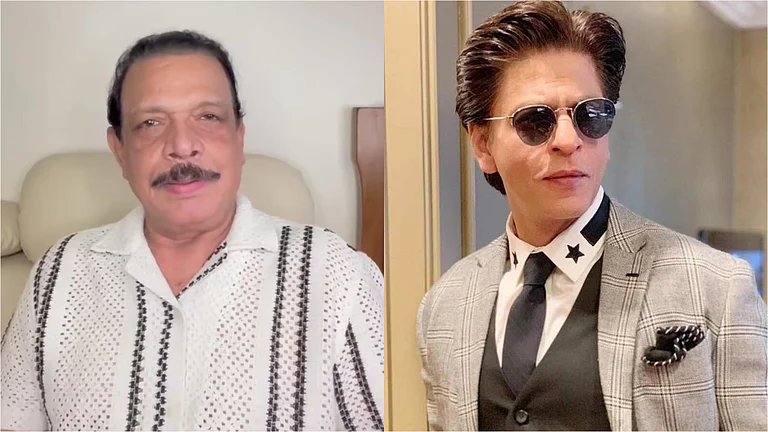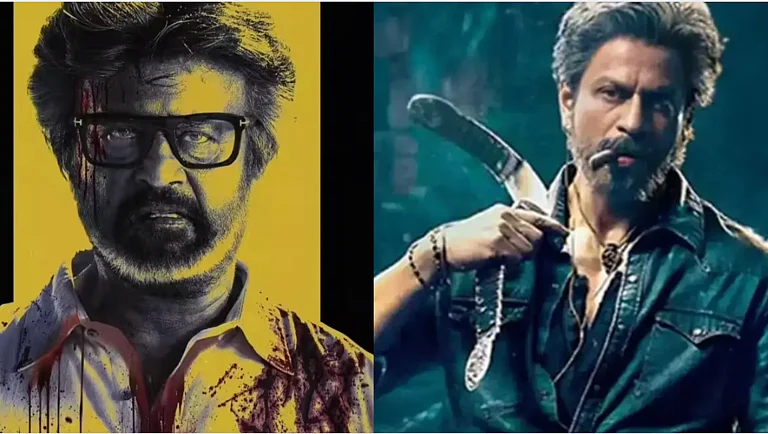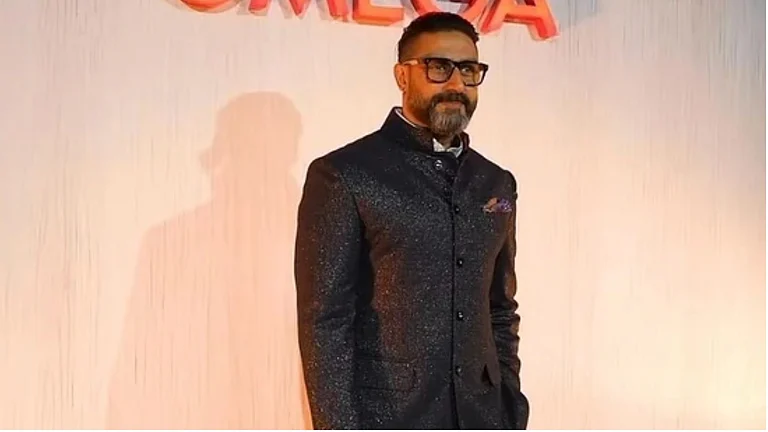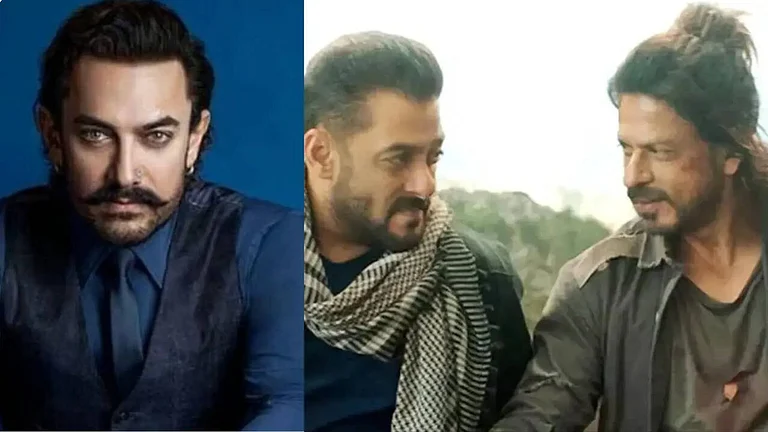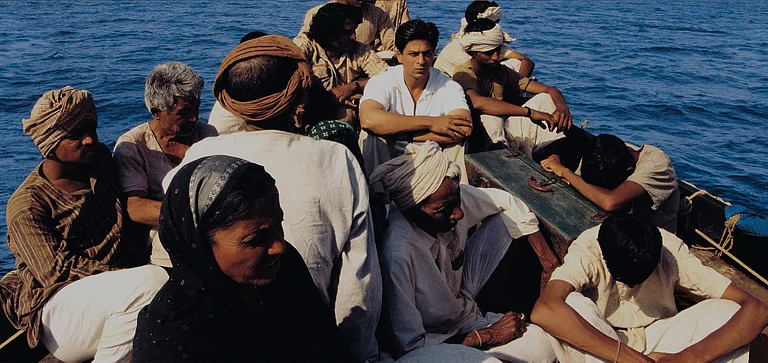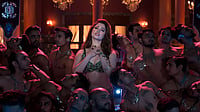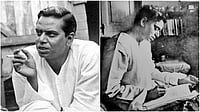
Bollywood superstar Shah Rukh Khan turns 60 on November 2, 2025.
Khan embodies the idea of India we are fast losing and now struggle to save.
His characters shift the idea of masculinity from being a provider and being a toxic male demanding, manipulating and pressurising for love, to earning, deserving and honouring it.
Vulnerable, light brown eyes that can move a million hearts, a smile with dimples that charm ages, open arms like he is welcoming the world for a tight warm embrace, never to let go, to comfort them till they heal, with pure love and grace—Shah Rukh Khan, since 1965.
What is it about Khan that makes him so crucial for us today, more than ever? He is (one of the) last of the stars by his own admission, especially to command the kind of unparalleled love that he does. He seems approachable, yet retains the enigma of a star. When the industry runs into financial losses, it's his films that cross so many crores, we don’t know how to count. But these aren’t the reasons why he is indispensable today. He embodies the idea of India we are fast losing—the India that some are fighting to retain, that existed at a simpler, more loving, softer time, with values that we have been proud to exhibit, and now struggle to save.

Khan embodies respect for everyone who meets him, has worked with him, lives with him—be it his family, his staff, his co-actors, crew, anyone. Whoever has a Shah Rukh story to tell, always says that he knows how to make them feel like the centre of the world at that point in time. And this idea of respect reflects not only in how he interacts with fans, but how he approaches his everyday life as well. Whether it is respecting women around him, holding their pallas and dress extensions as they move up and down the stage, lending them a hand as they climb up the stage or how he speaks of his female co-actors and so on. In a particularly adorable online video, he is seen carrying Rani Mukerji’s palla at the 71st National Film Awards. His respectful hugs on stage to actresses senior to him also speak volumes. Then, there is the critical respect shown to those most often eclipsed during the act of filmmaking—the technicians who make the films what they are, without whom it is impossible to mount a film or go through any process of film making. In Om Shanti Om (2007) and Main Hoon Na (2004), both directed by Farah Khan and produced by Red Chillies Entertainment, Khan’s company, the credits celebrate the crew in complete glory on screen. They make audiences see the people behind the names as the credit rolls, when most audience members tend to walk out of the theatre. It’s a beautiful way of commanding respect for everyone who works hard in shaping films.

The interfaith marriage of Khan and Gauri Khan is for the ages. They share a home where there is no mandate on anyone to follow anyone’s religion; and yet, many documentaries and Instagram posts show various festivals being celebrated in their house. In an India today where tolerance for all religions other than Brahmanical Hinduism is steadily shrinking, Khan—visibly Muslim in his identity and name—maintains the secular fabric of the country as a lived example. He exhibits that secularism, and his name, with equal aplomb, and reminds us of the fundamental principles this country was founded on—of tolerance, love and togetherness. Despite being heavily trolled for following an Islamic custom on Lata Mangeshkar’s funeral, Khan held on to his grace and his right to pray as he chooses with dignity in full public view—embodying the constitutional freedom that India promises its citizens.
Who can hold a mirror to government failures, when it is one as dictatorial as the BJP government? Not many. Especially on a large budget film? Certainly not many. But Khan does. Whether it is a hat tip to the death of children due to lack of oxygen (Gorakhpur- 2018), or to farmer suicides (11,290 in 2022) or the plea to vote wisely before the elections, Jawan (2023) is an important and brave film. While an out and out entertainer, with dollops of masala, it also marks political commentary from Khan’s protagonists, which is both timely and necessary. It’s something we see repeated, and done in the most delicious, satirical and confident way in The B****ds of Bollywood (2025) directed by his son, Aryan Khan. These works hark back to a time when the Indian film industries had the ability to look at the state of affairs in the country with a critical eye—exemplified by the cinema of the 50s, 60s and 70s. Filmmakers never shied away from looking at its realities to address them until recently, when truth became optional.

India, 78 years after its independence, has also become unapologetic, confident and comfortable in its own skin—an evolution we see in Khan’s persona as well. From the blundering, charming, loving Sunil in Kabhi Haan Kabhi Na (1994) to Pathaan (2023), Jawan and Dunki (2023), Khan is experimentative and confident even in the bizarrest of scenes (including pulling at two helicopters with one hand). Transforming from a villain (Baazigar, Anjaam, Darr, Don, Don 2) to the inherent romantic (Dilwale Dulhania Le Jaayenge, Dil Toh Paagal Hai, Dil Se, Kuch Kuch Hota Hai, Kabhi Khushi Kabhi Gham, Kabhi Alvida na Kehna, Mohabbatein, Devdas, Kal Ho Na Ho, Veer Zaara, Jab Tak Hai Jaan ) to the action hero with romance for the country, Khan has done it all.
Love and India are synonyms, as are love and Shah Rukh Khan. From being a lover who loses; to one who destroys himself in unrequited love; to one who creates love for his love to ensure she is loved even after he is dead; to the one who wins the family over for his love; to the one who fights for love against fear; to the one who sacrifices life while living for his love’s peace—Khan has played a bevy of characters. These characters shift the idea of masculinity from being a provider and being a toxic male demanding, manipulating and pressurising for love, to earning, deserving and honouring it. His soft masculinity in romantic roles, lean physique with no forcefully apparent masculine codes, extremely dignified holding of his female co-actor’s bodies, have all contributed to the idea of love being an equal, emotionally safe, happy experience. Herein, if sacrifices are made by both parties, emotional availability is also a responsibility of both—a masculinity Hindi cinema is deliberately forgetting with films like Animal (2023) and Dhurandhar (2025-upcoming) being celebrated, financed and looked forward to.

Khan is uniquely humble, uncomfortably intelligent, beautifully humane, honestly emotional and palpably vulnerable. This truth about him reflects the India that was—visibly emotional, gloriously sentimental, building relationships as we went, wearing our vulnerabilities, and talents on our sleeves. The heart of India that once beat was this, setting us apart from the rest of the world. There was little pretense in our reality, and that was our pride. A lot has changed in the last 11 years, where humility has given way to brazen chest beating, softness to toxicity, vulnerability to unnecessary aggression, assertion of power, and Brahmanical supremacy, and intelligence to the culture of stupidity.
Maybe for many of us, our love for him goes even beyond the love for the man, to the love for the country that we so desperately want to hold on to, and see reflected in the star of our times—Shah Rukh Khan, forever.







